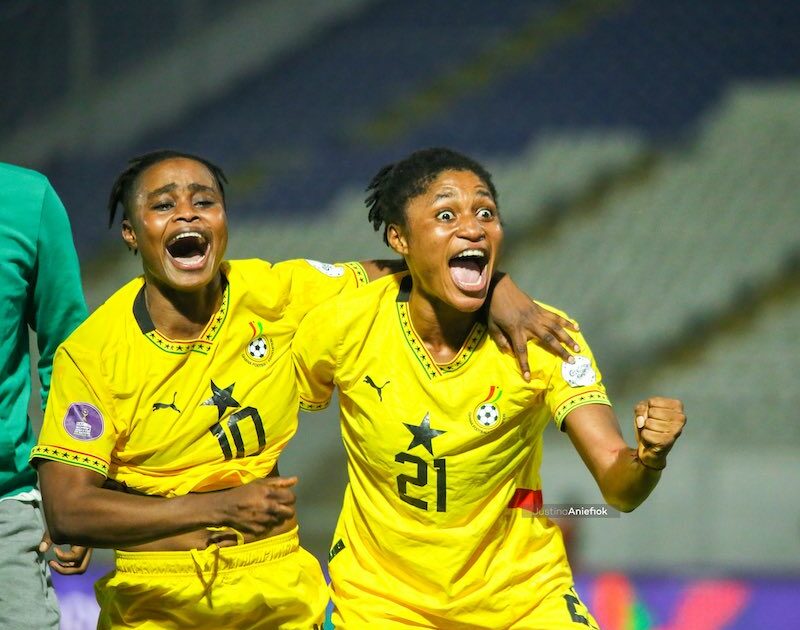Ghana’s Black Queens replicated their 2016 Women’s Africa Cup of Nations (WAFCON) success, securing a hard-fought third-place finish against South Africa in the 2024 edition. The bronze medal match, held at the Larbi Zaouli Stadium in Casablanca, was a dramatic encounter that showcased resilience, tactical adjustments, and ultimately, the nerve-wracking tension of a penalty shootout. Unlike their previous group-stage clash, where South Africa, the defending champions, comfortably dispatched Ghana 2-0, this encounter proved to be a far more competitive affair, with the Black Queens demonstrating a renewed determination and a desire to avenge their earlier defeat. The final scoreline of 4-3 in the penalty shootout reflects the closely contested nature of the match and the high stakes involved for both teams vying for a podium finish.
The match unfolded as a captivating back-and-forth affair, with both teams displaying periods of dominance. South Africa initially seized control, culminating in Nonhlanhla Mthandi’s goal just before halftime in the 45th minute. This late first-half strike injected further pressure on Ghana, demanding a response in the second half to avoid another defeat at the hands of their rivals. The Black Queens answered the call, exhibiting a more aggressive and cohesive attacking strategy. Their efforts were rewarded in the 68th minute when an unfortunate own goal by South African goalkeeper Andile Dlamini leveled the score. This equalizer not only shifted the momentum but also underscored the unpredictable nature of football. The own goal served as a testament to Ghana’s unwavering pressure and determination to claw their way back into the match.
With neither team able to break the deadlock in regulation time, the match proceeded directly to the heart-stopping drama of a penalty shootout. This decisive stage exposed the psychological fortitude and composure of both sides. Ghana’s players stepped up with confidence, demonstrating impressive accuracy and nerve under pressure. A. Kusi, J. Bonsu, J. Cudjoe, and N. Amoh all successfully converted their spot-kicks, contributing to the final 4-3 scoreline. Only C. Boye-Hlorkah’s attempt missed the mark for the Black Queens. South Africa, on the other hand, saw successful conversions from L. Motlhalo, B. Mbane, and J. Seoposenwe, but crucial misses by S. Holweni and H. Magaia ultimately cost them the match and a chance to repeat their third-place finish from the 2022 edition.
The victory for Ghana not only secured the bronze medal but also resonated with a sense of historical significance. It mirrored their achievement in the 2016 WAFCON tournament held in Yaoundé, where they similarly overcame South Africa, albeit with a 1-0 scoreline in regulation time, to clinch third place. This recurring success against South Africa in the third-place playoff underscores a pattern of resilience and a knack for performing under pressure in crucial matches. It further solidified Ghana’s position as a consistent force in African women’s football and a team capable of challenging the continent’s top contenders.
This victory carries significant implications for Ghana’s women’s football program. It provides a platform for continued growth and development, inspiring future generations of players. The experience gained in this tournament, particularly the resilience demonstrated in the face of adversity, will serve as a valuable asset moving forward. Moreover, the bronze medal finish reaffirms the team’s potential to compete at the highest level and reinforces the commitment to investing in and nurturing women’s football in Ghana.
The 2024 WAFCON bronze medal represents a culmination of hard work, tactical prowess, and unwavering team spirit. The Black Queens demonstrated their ability to learn from setbacks, adapt to challenging circumstances, and ultimately, triumph under pressure. This victory carries a symbolic weight, signifying not just a podium finish, but also the continued progress and potential of Ghanaian women’s football on the continental stage. It is a testament to the dedication of the players, the coaching staff, and the entire support system, and serves as a source of national pride and inspiration.


